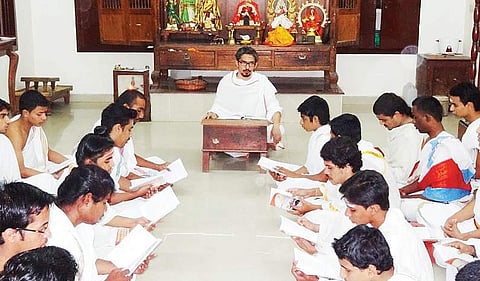

The 111-year-old Madras Sanskrit College digitised its manuscripts recently with the help of scholars.People from all over the world, including research scholars and lawmakers, visit this institution to study ancient texts.
CHENNAI:American scholar and researcher Sheldon Pollock shocked intellectuals across the country when he doled out his verdict on Deep Orientalism, saying the British merely propagated the already-existing oppressive systems intrinsic to Sanskrit. For years, our own textbooks have been sticking to research emanating from the West, something that Ramesh Mahalingam, trustee of the Madras Sanskrit College isn’t too happy about. In an event that saw the likes of Nirmala Sitharaman, Union Minister for Commerce and Industry present among others, the 111-year-old college flagged off their digital campus earlier this week, underlining the need for an online presence to preserve the true spirit of the language and its literary tradition.
As we walk through the rows of books and manuscripts preserved in the library, Ramesh observes, “Sanskrit goes beyond being just a Vedic language, beyond just religion and rituals. We have scientific, literary and philosophical traditions from the days of yore preserved in these texts, the value of which is apparent to other countries but not to people here.”
To take their entire physical campus online, the college has taken its first step in making a beginner’s module in Sanskrit available online. “There are 30 lessons spread over 16 weeks, so that learning is done at a comfortable space with enough room to clarify doubts and get each lesson right. The course also has live books, scholars available to clarify doubts, live webcasts and learning circles to facilitate better dialogue and discussion,” he adds, underlining the need to help people sharpen their skills in reading and writing in the language. This course will not focus on conversational Sanskrit, as it is primarily designed keeping scholars and the literarily inclined in mind.
A tour around this campus mandates a trip down memory lane. Set up in 1906 by V Krishnawami Iyer, a distinguished member of the city’s judicial class and the Governor’s Executive Council, the three acres has been dedicated to the passing down of Sanskritic tradition to all those who knock at its doors. “We have students from different parts of the world coming here for research. We have had people from the High Court spending hours in our libraries reading about Manu and how our judicial decisions can be backed by natural law laid down from Manusmriti. We have had people from Europe, Sri Lanka, USA and several other places read about different themes as part of their PhD. A woman did a thesis on women rights during the time of the Vedas — it opened our eyes as well when helping them,” explains an excited J Lalitha, a staff of the library.
Incidentally, select alumni from the college have joined author Rajiv Malhotra in countering Pollock’s findings and school of thought. The environment is reminiscent of a paatashala, which was once a part of the college’s premises, with Vedic chants resonating through its corridors as we near lunch time. “We only have male students, coming here to become scholars or researchers, while our certificate courses in Sanskrit attract women from all ages and walks of life,”
When we wished to understand the target demographic, Ramesh says. “This is another driving force behind wanting to go online because now, accessibility of this course increases across different academic and social sections.”
Besides aiding with the digitisation of the library and its 1,500 manuscripts, Ramesh promises that the digital initiative will also see several other modules cutting across philosophy, math, science, literature and culture to be made available online over the course of the coming year. The college is also working on collaborations with universities across the globe to make this course all-inclusive and improve quality of education on the portal.
Online course fee: `3000. For details log on to digital.madrassanskritcollege.edu.in
(The writer is a freelance journalist)